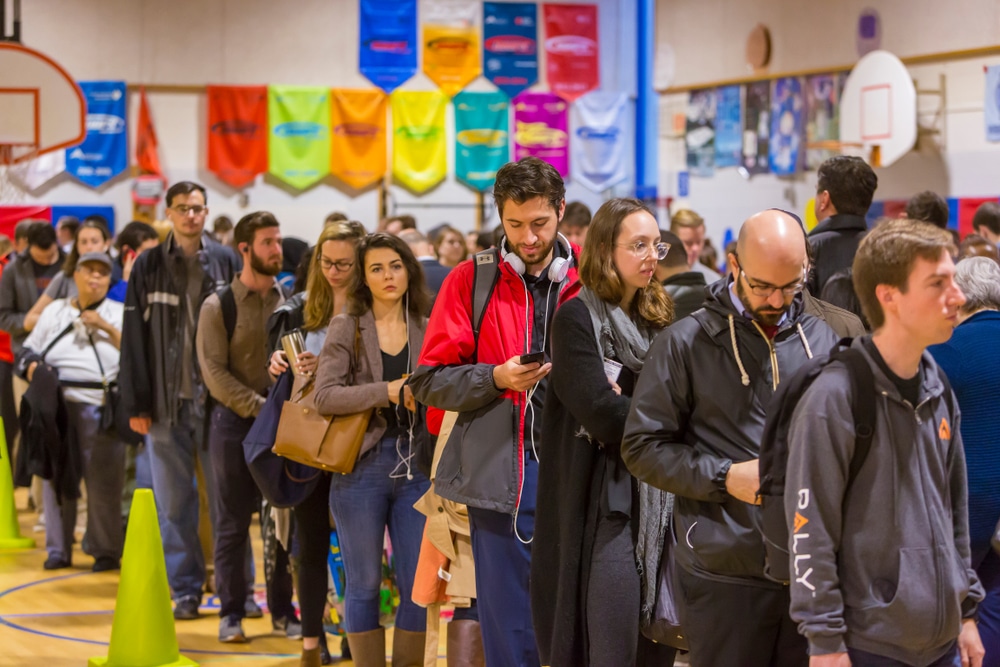Over the years the United States has seen a lower voter turnout when compared with other countries. While the 2018-2022 elections saw historic levels of voter turnout – with 46 percent of eligible voters turning out in the 2022 midterm elections and about 66 percent of eligible voters turning out in the 2020 elections – the U.S. has seen regular high rates of absenteeism on Election Day.
But just weeks ahead of the historic elections on November 5 in the United States, researchers at the University of Georgia published a study suggesting that implementing compulsory voting in the United States would prove a means of strengthening and protecting the country’s democracy. Their research comes at a time where Republicans across the United States are purging voters from the voting rolls and gerrymandering has long divided voting blocks.
“The U.S. has low turnout compared to other developed democracies, and so this is a pretty blunt tool that’s been proven to be able to increase turnout,” Shane P. Singh, a Professor in the Department of International Affairs in the School of Public and International Affairs at the University of Georgia who led the study, told the Bucks County Beacon. “Compulsory voting in increasing turnout also tends to level out disparities internal between different socio-economic groups.”
Compulsory voting is not an old idea. It stands in opposition to the voluntary voting that is practiced in the United States. But the idea and benefits of compulsory voting have come up before in U.S. politics.
While the only city to adopt compulsory voting was Kansas City, Missouri, in 1889, state bills have come up across the country seeking to implement some form of mandatory voting. The idea was to end voter suppression, boost participation, and improve confidence in government.
Politicians too have sought to promote the benefits of mandatory voting in attempts to increase participation. In 2015, then President Barack Obama suggested adopting mandatory voting as a means to counter the influence of big money in politics. He pointed out that other countries have adopted the practice, saying “it would be transformative if everybody voted – that would counteract money more than anything.”
But Democrats are not the only ones who have suggested adopting compulsory voting. In October 2024 in the lead up to the elections, Republican candidate Donald Trump suggested egotistically in a rambling speech the U.S. needed compulsory voting because it would lead to his victory.
But in general the criticism in the United States against adopting compulsory voting has come from the right, presenting it as an attack on personal freedom.
“There’s this tradition of freedom from the state in your appearance, the sort of laissez faire spirit ,” Singh explains. “I think overcoming that in the United States is hard. If you look at opinion polls, 25 percent maybe of people support compulsory voting and overcoming that I think is the biggest challenge.”
But there are examples of its success across the globe. Many countries have had automatic registration and compulsory voting as their norm for decades, resulting in an increase in civic engagement.
Among the countries that Singh and his colleagues point to are Australia and Brazil.
Compulsory voting is baked into Australian democracy.
In July 2024 Australia marked the 100th anniversary of adoption of compulsory voting in the country’s constitution. Every Australian is automatically registered to vote as soon as they turn 18 years of age, and required to turn out to vote. If they do not turn out, they face fines starting at $50 to $75 dollars.
But the country has regularly seen high voter turnout in elections, which have become like community gatherings, strengthening the democratic tradition.
“[Compulsory voting] effectiveness in Australia has kept [voter] turnout at over 90 percent since its first put in place in 1925,” Paul Strangio, an Emeritus Professor of Politics at Australia’s Monash University, told the Bucks County Beacon.
“The United States is often held up as something of a beacon of democratic practice,” Stangio explains. “But I think Australia is something more like a democratic practice.”
The electoral process is a highly organized machine, seeking to maintain confidence in the democratic process. Elections in Australia are overseen by an independent electoral body, the Australian Electoral Commission, which is tasked with setting up and running elections every three years.
The body has sought to remain transparent and professional in the electoral process, gaining a high approval rating across the country.
“The [Australian Electoral Commission] has the highest rate of confidence of any public agency in Australia they have in surveys. They get upwards of 95 percent trust,” Jill Sheppard, a professor who specializes in studying elections and compulsory voting at Australian National University, told the Bucks County Beacon. “They run impeccable elections. They don’t make mistakes, and when they do make mistakes, they overcorrect [so any mistakes don’t happen again].”
While Australia’s system does assist in addressing social inequalities, it isn’t perfect. Over the years voter participation in rural communities has steadily decreased. In some areas it has fallen to just over 66 percent, according to Strangio.
In spite of this, compulsory voting has remained part of Australian political culture, even to the point where some younger generations have taken it for granted. This all comes as a reverse of what Australian popular culture portrays of the country.
“It really is incredible how much we have this sense of ourselves as being very subversive and ungovernable,” Sheppard says. “But then how willing we are to just keep turning up to vote.”
Brazil is widely recognized as a young democracy when compared with Australia and the United States. But it is one of the many countries in Latin America that has embraced compulsory voting.
Compulsory voting is enshrined in article 14 of the 1988 Brazilian constitution, which establishes that voting is mandatory for all Brazilians over the age of 18. Voting is optional for people who are illiterate, over 70-years-old, or for those between 16 and 18 years of age.
While the country has had compulsory voting in their constitution since at least 1932, it was the end of the 20 years of military dictatorship in 1985 that spurred the embracing of compulsory voting.
“We were coming out of a dictatorial regime and as we were coming out of this dictatorial process it was necessary to include the people in the democratic processes,” Michelle Fernández, a researcher at the Institute of Political Science at the University of Brasilia, told the Bucks County Beacon. “At that time it seemed like a good idea to make elections mandatory so that people could create that culture of democratic participation after it was taken away for 20 years.”
Brazil is not the only Latin American country that established compulsory voting following the era of dictatorships. Neighboring countries like Uruguay, Argentina, and Chile also have compulsory voting enshrined in their constitutions. Mexico too has compulsory voting, though it is largely not enforced.
For Brazilians, if one decides to not vote, they must pay a small fee of 3.51 Reales, or about .60 cents USD. In the 2022 elections, nearly 80 percent of potential voters participated in the contested election between Luiz Inácio Lula da Silva and Jair Bolsonaro, which saw Lula da Silva win and Bolsonaro’s supporters attempt a coup d’etat on January 8, 2023.
But in spite of the polarization in Brazil, which has seen a strong far-right emerge in the last decade, there is no discussion or calls for the removal of compulsory voting in the South American country.
“It has strengthened, that is, the electoral political participation of the population or to understand that these processes are important for the political construction of the country,” Fernández says.
At a time where political polarization and populism are on the rise, there is evidence that compulsory voting could reverse these trends.
According to the research of Anthoula Malkopoulou, a Political Science Lecturer at the Department of Government at Sweden’s Uppsala University, compulsory voting can ease the political extremes, especially right-wing extremism. There is a channeling of the vote that limits extremist parties from gaining too much influence.
“[Compulsory voting] becomes a kind of shield against populism,” Malkopoulou told the Bucks County Beacon, describing it as one of the factors that compulsory voting can provide. “The whole argument of populism is that ‘we are the silent majority and voices are not heard,’ and so also this one kind of collapses when you have comparative voting because everyone is represented.”
This is a key benefit of compulsory voting that benefits the democratic order, and challenges Trump’s own statements that he’d easily win if the U.S. had compulsory voting. And echoing Malkopoulou’s research, the experts on compulsory voting suggest that due to the systems in place, the country is unlikely to see a populist like Trump emerge any time soon.
“I don’t think Trump would work here [in Australia],” Strangio says. “He couldn’t get away with that sort of demagoguery-tracked theatrics he performs in the United States because of the broader cultural things in Australia.”
Citing further international research on compulsory voting, Sheppard points out compulsory voting does result in more left-wing and progressive political success than what is seen in a voluntary voting system. She suggests that is in part due to the inclusion of disenfranchised voters largely from marginalized communities.
“And that makes sense conceptually,” she explains. “If you enfranchise parts of the community that wouldn’t vote otherwise – the poorest, the least educated, the most marginalized – and ensure that they vote, they have to be heard.”
Rather than making voting more difficult, it is advantageous for the democracy of the United States to permit more people to vote and to make it easier to vote. This is the opinion of academics like Malkopoulou, who suggests that the United States could adopt other measures that make voting easier before they take the step towards mandatory voting.
Increasing voter participation at a time when voting is being systematically limited through Republican-led voter purges and voter suppression efforts seems like a far off possibility. While the adoption of compulsory voting could help improve participation and raise voices, it still faces an uphill battle as democratic institutions are being eroded.
“I don’t see compulsory voting as the Silver Bullet that’s going to fix democracy,” Singh explains. “But I think it has potential.”






